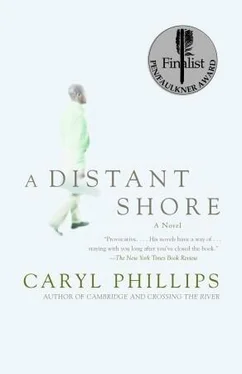“Solomon, the first line of defence is prejudice. Once you get past that, there’ll always be a little corner where you can live and be who or what you want to be. But you’ve got to get past that first line, and things are not getting any easier. There’s an awful lot of you, and the system’s already creaking to breaking point. I mean, things are particularly bad if you want to get into one of our hospitals. People are upset.” He looked closely at me now, as though trying to read my thoughts. “You do understand what I’m trying to say to you, don’t you, Solomon?”
I nodded, although I was unsure of what exactly Mr. Anderson was trying to say.
“You see, Solomon, it’s just that this isn’t a very big island and we don’t have that much room. People think that other countries should take you first because we’ve done our bit.” He paused and looked away. “I’m sorry, Solomon, but some folk think these things. That you just want an easy living, or that you have too many children. They think that you don’t really want to work. It’s in their heads and it makes them mad.”
“Who put it there?”
Mr. Anderson turned to look at me, and I could see that he was surprised that I had asked this question. And then his face softened.
“I don’t know, Solomon. I really don’t know.”
We sat together in the car park for many more minutes, but neither of us said anything further, nor did we make eye contact. Mr. Anderson was clearly unsettled by what had happened to his house and he did not know what to do. I now understood that explaining these things to me was a way of explaining them to himself, but the puzzled look on Mr. Anderson’s face suggested that he remained troubled by many questions.
Two days later, Mike returned from a long trip. I sat in my room and I could hear him talking with Mr. and Mrs. Anderson. Their voices were low, and I assumed that they were whispering to prevent me from hearing whatever words they were exchanging. In my heart I felt that they were speaking of me, but I could not be sure. And then Mike knocked on my door, and I encouraged him to enter and he sat on the edge of my bed.
“How’s it going, Solomon?”
I smiled, but I said nothing. For a moment all I could hear was the creaking of the bed, and I worried that perhaps Mike had lost his nerve. But then he coughed.
“Look, Mum told me what happened, but you’ve got to understand that some people bring things on themselves, you know. I mean, these days particularly the Indian types.” Mike stopped and sighed, and then he looked at me. “I’m an old traditionalist, Solomon. I want fish and chips, not curry and chips. I’m not prejudiced, but we’ll soon be living in a foreign country unless somebody puts an end to all this immigration. These Indians, they still make their women trail after them, and they have their mosques and temples, and their butcher shops where they kill animals in the basement and do whatever they do with the blood. I mean, they’re peasants. They come from the countryside and most of them have never seen a flush toilet or a light switch. It’s too much for them. And for us. There ought to be some training or they should go back. It’s these kinds of people that cause others to have bad attitudes and to do things like they’ve done to Mum’s wall. I’m not saying they’re right, because they’re not. But I drive around a lot, and I see how people feel, more than what the old folks does. It’s everywhere.” Mike stopped talking and he stared at me, but with a worried look on his face. “You see, you’re in a different situation, Solomon. You’re escaping oppression and that’s different. We’ve got procedures for that. I mean, you’re working. You’re no scrounger. But they don’t know that, and so that’s what happens.” Mike paused. “You do know what I’m saying, don’t you, Solomon?” I looked at Mike and nodded. I knew what he was saying. I understood him.
When my papers finally came through, and the letter arrived informing me that I could legally stay in Britain, Mum insisted that they take me out to a local fish restaurant to celebrate. Mike was away and so it was just the three of us, but I could sense that Mr. Anderson was not altogether comfortable. He looked blankly at the menu and then he eventually told Mum to order for him. Mum could not have been happier and, although she tried not to show it, she was proud of me and regarded my “legal” status as her own personal triumph. I had never before seen her take any alcohol, but with this meal she drank a glass of red wine. Mr. Anderson waited until he had finished his food before he turned to me and asked what I thought I might do now that I had, as he put it, “choice.” I did not know. Nearly one whole year had passed since Mike had brought me to their home, and in that time I had acquired many building skills. I was blessed to be in England, but this life bore no relationship to the one I had known in my own country, and as a consequence I felt as though my new family knew only one small part of me. In truth, only one half of me was alive and functioning. I had tried to talk to the few West Indian people I saw standing on the streets outside Sonja’s Caribbean Takeaway with their dreadlocks and their cans of beer, but they were not friendly and they would often look the other way or shout at me and behave like drunken people. And I had long ago learned that there was little point in attempting conversation with the Indians or Pakistanis, for they were worse than some of the English people. I sat in the fish restaurant and looked at Mr. and Mrs. Anderson and told them that I did not know what I would do now that I had “choice.” Become less lonely? That was all I hoped for. But then it suddenly occurred to me what Mr. Anderson might be suggesting, and I felt stupid. Now that I was legal, they wanted me to leave their home and find somewhere else to live. Their task was complete. Perhaps they had discovered another person to live with them? I could not be sure, but I felt as though Mr. and Mrs. Anderson were letting me go, and so I decided that as soon as I could find a respectful moment I would share with my benefactors the news that it was time for Solomon to move on and that sadly I would now have to leave their blessed home.
I have been here for a month and the villagers are becoming familiar with me. Each evening they see me with my torch, and some among them even speak to me. They rarely say more than “Evening,” but this is enough. It is a beginning. And then this morning I received a letter. I do not usually receive letters. I am looking at it now, on the table in front of me. It is a letter from somebody who is not my friend, but they have signed their name as though I ought to know who they are. The words are ugly and I am unsure what I have done to offend this person, but after the unfortunate incident at Mr. Anderson’s house, and after listening to Mike, I know that this type of person exists. Some of these people worked for Mr. Anderson on the building site, and the boys I met down by the water, they suffer from this mental condition. Unfortunately, the letter loudly proclaims that such people reside in my immediate vicinity. I hold the letter and then turn it over in my hands. I am not afraid of this communication, but it is difficult for me to know what to do. To discard the offending article would probably be the wise decision, but I wish to keep it although I am not sure why. Perhaps to show that I am not afraid. This seems to me to be a fine reason, and so I replace the letter on the table and decide that I will look at it every day. I am not afraid.
As I drive past the bus stop, I see her. I often see her standing by herself at the bus stop. She lives in the house next to me, but she is a private woman. She is very beautiful for her years. A decent woman, who I feel could help the younger women of this country learn how to groom themselves properly. She carries her head high as though she is proud of who she is, and I admire her dignity. Sometimes I secretly watch her from my living room as she sits and stares out of her window. She appears lonely. Mike saved me from the rain like a Good Samaritan, and although it is not truly raining, for only a helpless drizzle wets my windscreen, I feel that it is my duty to stop at the bus stop and rescue this woman. I continue to drive away from the bus stop, but resolve that the next time that I see this woman, I will stop for her. Sadly, I have to confess I have made this promise in the past and I have failed to find the courage to honour it. But I now know that whatever the price I will rescue this woman.
Читать дальше











![Карен Кингсбери - A Distant Shore [calibre]](/books/384306/karen-kingsberi-a-distant-shore-calibre-thumb.webp)
